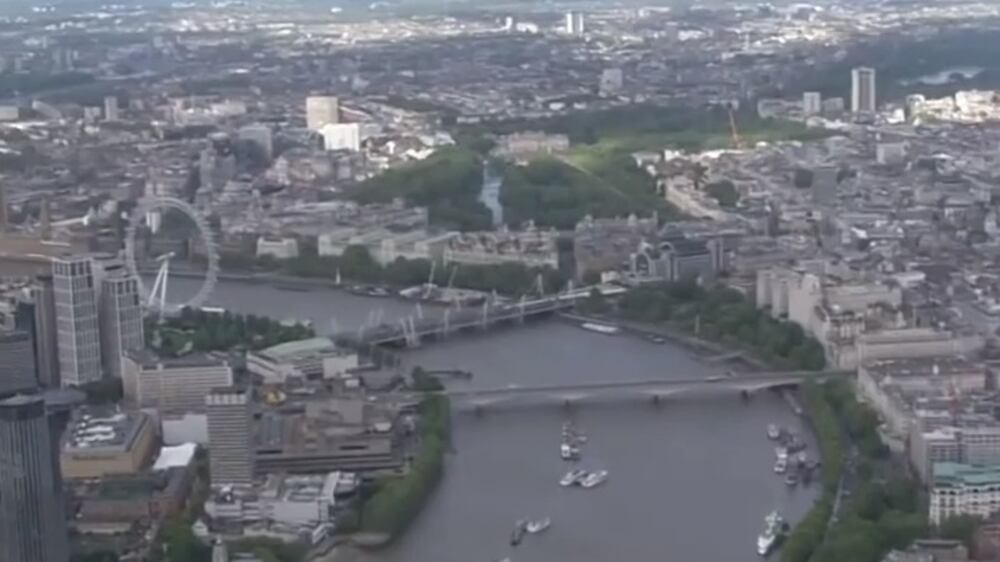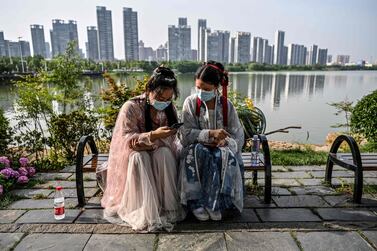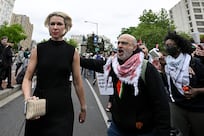British Prime Minister Boris Johnson offered only limited relief from lockdown on Sunday, after a day of continued criticism of his government's Covid-19 strategy.
In a televised address, Mr Johnson encouraged Britons who could not work from home to return to their jobs but avoid public transport as the UK sought to avoid a second wave of cases.
Britain has recorded at least 31,855 deaths, the highest total behind the US.
Mr Johnson said that starting on Wednesday, a restriction limiting outdoor exercise to once a day would be lifted.
But he insisted that social distancing would still have to be followed so that a second sharp rise in infections did not occur.
"This is not the time simply to end the lockdown this week," Mr Johnson said.
"Instead we are taking the first careful steps to modify our measures."
He outlined a "conditional plan" for relaxing other lockdown restrictions in the coming months, including possibly opening schools for some younger children on June 1.
Parts of the hospitality industry could open from July.
Mr Johnson said he was "serving notice" that it would soon be time to put arriving air passengers in quarantine.
"We must continue to control the virus and save lives," he said.
"And yet we must also recognise that this campaign against the virus has come at colossal cost to our way of life."
Mr Johnson unveiled a coronavirus alert system for Britain that was based on the country's spread of the disease. It would determine how strict its lockdown measures were.
"The higher the level, the tougher and stricter we will have to be. There will be five alert levels," he said.
"Level One means the disease is no longer present in the UK and Level Five is the most critical, the kind of situation we could have had if the NHS had been overwhelmed.
"Over the period of the lockdown we have been in Level Four, and it is thanks to your sacrifice we are now in a position to begin to move in steps to Level Three."
Mr Johnson urged the public to continue to keep the infection rate of the virus down.
He said although different parts of the country should be "flexible in our response", there was "a strong resolve" from England, Scotland, Wales and Northern Ireland to beat the virus together.
Members of Mr Johnson’s government have pushed for a re-opening of the economy amid concerns of a major recession.
But scientists have warned that an end to the lockdown could prove calamitous.
A group of advisers from Imperial College London said 100,000 people could die if the UK eased the lockdown too far and too fast, The Sunday Times reported.
The government has faced criticism over its handling of the Covid-19 crisis, particularly its failure to provide protective equipment for front-line health workers and its patchy programme of testing and tracking cases.
A minister confirmed reports on Sunday that the UK had to send some of its tests for processing in the US after a problem at one of its laboratories.
British opposition Labour leader Keir Starmer said Mr Johnson's speech on easing the lockdown raised more questions than it answered.
"We see the prospect of England, Scotland, Wales and Northern Ireland pulling in different directions," Mr Starmer said.
"The prime minister appears to be effectively telling millions of people to go back to work without a clear plan for safety or clear guidance as to how to get there without using public transport.
"What the country wanted tonight was clarity and consensus, but we haven’t got either of those."
Campaigners on Sunday also called for an independent inquiry to restore “public confidence” into why the coronavirus had a disproportionate effect on the UK's black, Asian and minority ethnic communities.
Analysis by the UK’s data body found that black people were more than four times more likely to die than whites.
Mr Johnson said people would be allowed to spend unlimited time out of their homes to exercise, sunbathe and play sports.
The new advice came as the government’s key message changed from “stay to home” to “stay alert”, despite criticism that the authorities were sending mixed messages.
Scottish First Minister Nicola Sturgeon said the "vague and imprecise" slogan could be "catastrophic" and would not be used in Scotland.
“We need absolute clarity from Boris Johnson,” Jonathan Ashworth, the health spokesman for the Labour Party, told Sky News. “There’s no room for nuance in this.”
Prof Peter Horby, chairman of a government advisory group on respiratory viruses, said ministers should be cautious about easing the lockdown.
Germany and South Korea, with significantly fewer cases than in the UK, have reported a rise in cases after easing restrictions.
“We have to be clear that this is not like a storm where we batten down the hatches and then it passes by, and we walk out into the sunshine and it's gone,” Prof Horby told the BBC.
Police warned they were fighting a losing battle as large numbers of people congregated at parks and open spaces during warm weather on Saturday.
It followed a host of newspaper headlines based on unidentified government sources that said Mr Johnson would announce a significant reduction in lockdown restrictions.
But Britons appear largely unwilling to end the lockdown.
A survey in The Sun on Sunday newspaper said 90 per cent of those who responded were against the move.








